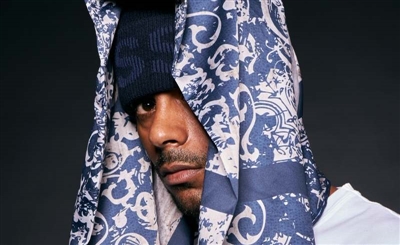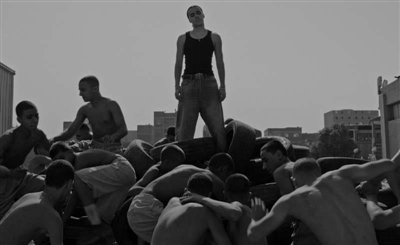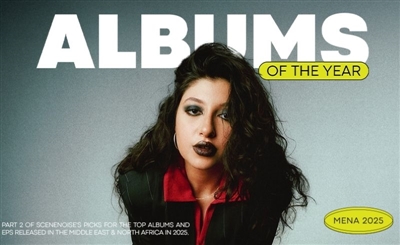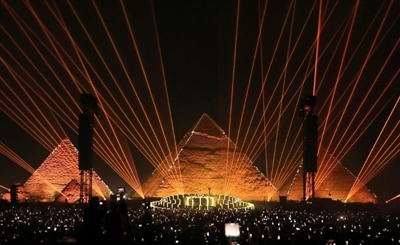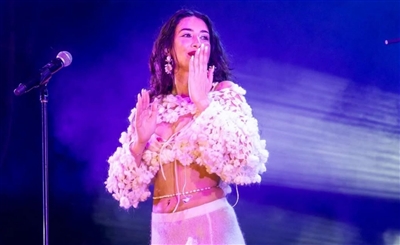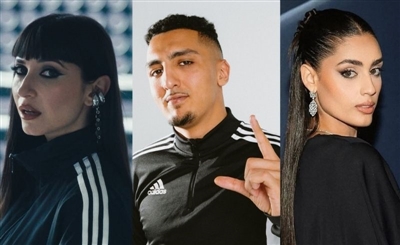Radio is Not Dead: London-Based DJ Nooriyah on Championing Arab Music in the UK
In an age dominated by social media and streaming, Nooriyah hasn’t given up on radio - a medium that has not only provided her with the freedom to promote Arab music in the UK, but helped facilitate her own music-making ambitions, as we found out in this candid interview.
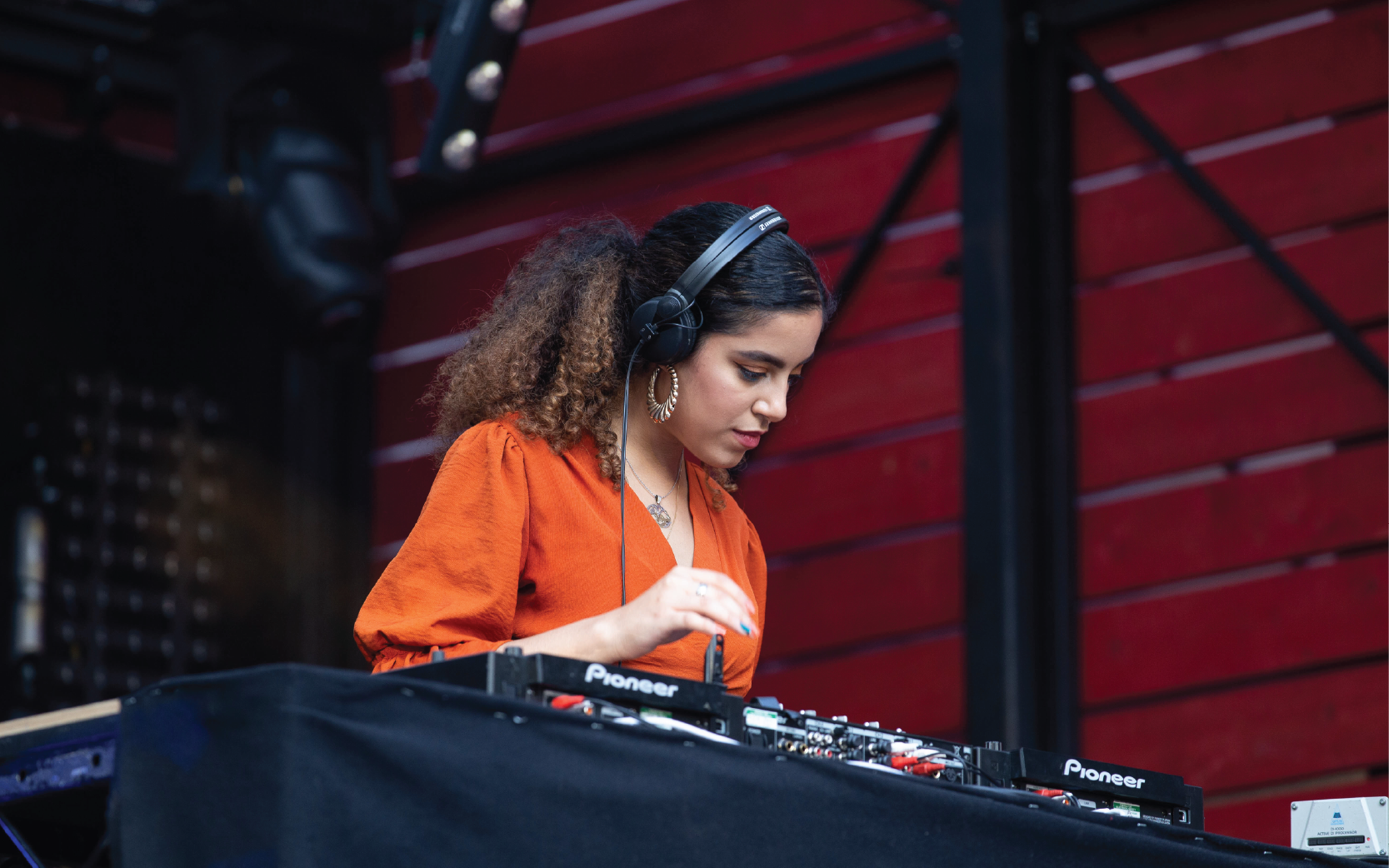
For the most part, the Middle East’s music scene is a largely insular bubble; saved for a few names here and there, very little of the enormous wave of music coming out of the region in recent years has made it onto the global radar. Aside from the occasional radio spot or one-off episodes and singular collabs, there are very few platforms highlighting the sound of the region on a recurring basis.
Enter Nooriyah, a London based DJ and radio host of Saudi Arabian heritage, and one of very few selectors regularly pushing a 100% Middle Eastern/North African sound on the UK airwaves. I was first introduced to Nooriyah the way I think most people were, through her semi-viral Instagram mix series highlighting popular western music that had sampled Middle Eastern classics.
Upon first stumbling upon the video, more than a few questions popped into my head: What's with comic sans and green screen? Is this a meme? Do none of the people in the comments know what sampling is? What’s going on here exactly??
<blockquote class="instagram-media" data-instgrm-permalink="https://www.instagram.com/reel/CJ6bzoehVjp/?utm_source=ig_embed&utm_campaign=loading" data-instgrm-version="13" style=" background:#FFF; border:0; border-radius:3px; box-shadow:0 0 1px 0 rgba(0,0,0,0.5),0 1px 10px 0 rgba(0,0,0,0.15); margin: 1px; max-width:540px; min-width:326px; padding:0; width:99.375%; width:-webkit-calc(100% - 2px); width:calc(100% - 2px);"><div style="padding:16px;"> <a href="https://www.instagram.com/reel/CJ6bzoehVjp/?utm_source=ig_embed&utm_campaign=loading" style=" background:#FFFFFF; line-height:0; padding:0 0; text-align:center; text-decoration:none; width:100%;" target="_blank"> <div style=" display: flex; flex-direction: row; align-items: center;"> <div style="background-color: #F4F4F4; border-radius: 50%; flex-grow: 0; height: 40px; margin-right: 14px; width: 40px;"></div> <div style="display: flex; flex-direction: column; flex-grow: 1; justify-content: center;"> <div style=" background-color: #F4F4F4; border-radius: 4px; flex-grow: 0; height: 14px; margin-bottom: 6px; width: 100px;"></div> <div style=" background-color: #F4F4F4; border-radius: 4px; flex-grow: 0; height: 14px; width: 60px;"></div></div></div><div style="padding: 19% 0;"></div> <div style="display:block; height:50px; margin:0 auto 12px; width:50px;"><svg width="50px" height="50px" viewBox="0 0 60 60" version="1.1" xmlns="https://www.w3.org/2000/svg" xmlns:xlink="https://www.w3.org/1999/xlink"><g stroke="none" stroke-width="1" fill="none" fill-rule="evenodd"><g transform="translate(-511.000000, -20.000000)" fill="#000000"><g><path d="M556.869,30.41 C554.814,30.41 553.148,32.076 553.148,34.131 C553.148,36.186 554.814,37.852 556.869,37.852 C558.924,37.852 560.59,36.186 560.59,34.131 C560.59,32.076 558.924,30.41 556.869,30.41 M541,60.657 C535.114,60.657 530.342,55.887 530.342,50 C530.342,44.114 535.114,39.342 541,39.342 C546.887,39.342 551.658,44.114 551.658,50 C551.658,55.887 546.887,60.657 541,60.657 M541,33.886 C532.1,33.886 524.886,41.1 524.886,50 C524.886,58.899 532.1,66.113 541,66.113 C549.9,66.113 557.115,58.899 557.115,50 C557.115,41.1 549.9,33.886 541,33.886 M565.378,62.101 C565.244,65.022 564.756,66.606 564.346,67.663 C563.803,69.06 563.154,70.057 562.106,71.106 C561.058,72.155 560.06,72.803 558.662,73.347 C557.607,73.757 556.021,74.244 553.102,74.378 C549.944,74.521 548.997,74.552 541,74.552 C533.003,74.552 532.056,74.521 528.898,74.378 C525.979,74.244 524.393,73.757 523.338,73.347 C521.94,72.803 520.942,72.155 519.894,71.106 C518.846,70.057 518.197,69.06 517.654,67.663 C517.244,66.606 516.755,65.022 516.623,62.101 C516.479,58.943 516.448,57.996 516.448,50 C516.448,42.003 516.479,41.056 516.623,37.899 C516.755,34.978 517.244,33.391 517.654,32.338 C518.197,30.938 518.846,29.942 519.894,28.894 C520.942,27.846 521.94,27.196 523.338,26.654 C524.393,26.244 525.979,25.756 528.898,25.623 C532.057,25.479 533.004,25.448 541,25.448 C548.997,25.448 549.943,25.479 553.102,25.623 C556.021,25.756 557.607,26.244 558.662,26.654 C560.06,27.196 561.058,27.846 562.106,28.894 C563.154,29.942 563.803,30.938 564.346,32.338 C564.756,33.391 565.244,34.978 565.378,37.899 C565.522,41.056 565.552,42.003 565.552,50 C565.552,57.996 565.522,58.943 565.378,62.101 M570.82,37.631 C570.674,34.438 570.167,32.258 569.425,30.349 C568.659,28.377 567.633,26.702 565.965,25.035 C564.297,23.368 562.623,22.342 560.652,21.575 C558.743,20.834 556.562,20.326 553.369,20.18 C550.169,20.033 549.148,20 541,20 C532.853,20 531.831,20.033 528.631,20.18 C525.438,20.326 523.257,20.834 521.349,21.575 C519.376,22.342 517.703,23.368 516.035,25.035 C514.368,26.702 513.342,28.377 512.574,30.349 C511.834,32.258 511.326,34.438 511.181,37.631 C511.035,40.831 511,41.851 511,50 C511,58.147 511.035,59.17 511.181,62.369 C511.326,65.562 511.834,67.743 512.574,69.651 C513.342,71.625 514.368,73.296 516.035,74.965 C517.703,76.634 519.376,77.658 521.349,78.425 C523.257,79.167 525.438,79.673 528.631,79.82 C531.831,79.965 532.853,80.001 541,80.001 C549.148,80.001 550.169,79.965 553.369,79.82 C556.562,79.673 558.743,79.167 560.652,78.425 C562.623,77.658 564.297,76.634 565.965,74.965 C567.633,73.296 568.659,71.625 569.425,69.651 C570.167,67.743 570.674,65.562 570.82,62.369 C570.966,59.17 571,58.147 571,50 C571,41.851 570.966,40.831 570.82,37.631"></path></g></g></g></svg></div><div style="padding-top: 8px;"> <div style=" color:#3897f0; font-family:Arial,sans-serif; font-size:14px; font-style:normal; font-weight:550; line-height:18px;"> View this post on Instagram</div></div><div style="padding: 12.5% 0;"></div> <div style="display: flex; flex-direction: row; margin-bottom: 14px; align-items: center;"><div> <div style="background-color: #F4F4F4; border-radius: 50%; height: 12.5px; width: 12.5px; transform: translateX(0px) translateY(7px);"></div> <div style="background-color: #F4F4F4; height: 12.5px; transform: rotate(-45deg) translateX(3px) translateY(1px); width: 12.5px; flex-grow: 0; margin-right: 14px; margin-left: 2px;"></div> <div style="background-color: #F4F4F4; border-radius: 50%; height: 12.5px; width: 12.5px; transform: translateX(9px) translateY(-18px);"></div></div><div style="margin-left: 8px;"> <div style=" background-color: #F4F4F4; border-radius: 50%; flex-grow: 0; height: 20px; width: 20px;"></div> <div style=" width: 0; height: 0; border-top: 2px solid transparent; border-left: 6px solid #f4f4f4; border-bottom: 2px solid transparent; transform: translateX(16px) translateY(-4px) rotate(30deg)"></div></div><div style="margin-left: auto;"> <div style=" width: 0px; border-top: 8px solid #F4F4F4; border-right: 8px solid transparent; transform: translateY(16px);"></div> <div style=" background-color: #F4F4F4; flex-grow: 0; height: 12px; width: 16px; transform: translateY(-4px);"></div> <div style=" width: 0; height: 0; border-top: 8px solid #F4F4F4; border-left: 8px solid transparent; transform: translateY(-4px) translateX(8px);"></div></div></div> <div style="display: flex; flex-direction: column; flex-grow: 1; justify-content: center; margin-bottom: 24px;"> <div style=" background-color: #F4F4F4; border-radius: 4px; flex-grow: 0; height: 14px; margin-bottom: 6px; width: 224px;"></div> <div style=" background-color: #F4F4F4; border-radius: 4px; flex-grow: 0; height: 14px; width: 144px;"></div></div></a><p style=" color:#c9c8cd; font-family:Arial,sans-serif; font-size:14px; line-height:17px; margin-bottom:0; margin-top:8px; overflow:hidden; padding:8px 0 7px; text-align:center; text-overflow:ellipsis; white-space:nowrap;"><a href="https://www.instagram.com/reel/CJ6bzoehVjp/?utm_source=ig_embed&utm_campaign=loading" style=" color:#c9c8cd; font-family:Arial,sans-serif; font-size:14px; font-style:normal; font-weight:normal; line-height:17px; text-decoration:none;" target="_blank">A post shared by NOORIYAH 🎧 (@nooriyah._)</a></p></div></blockquote> <script async src="//www.instagram.com/embed.js"></script>
A deeper dive through Nooriyah’s social media platforms and SoundCloud page answered many of the above questions, and revealed an enormous amount of depth that might have gone under the radar of anyone who stopped digging beyond her Instagram clips. I reached out to Nooriyah, and soon learned her social media presence was just the tip of a much larger iceberg formed by an intentional body of work that encompasses music, literature, and film, and is grounded by a strong desire to highlight and uplift marginalized voices from across the MENA region and diaspora.
Tell us a bit about yourself, Nooriyah.
I am a DJ based in London known for playing popular tunes mixed with Middle Eastern and North African hues and sounds. Aside from that, I'm a presenter and filmmaker focussing on the themes of culture, gender and the idea of home. I currently have two DJ residencies specialising in Middle Eastern/North African sounds here in London, at Foundation FM and Plus1 Radio, as well as experimenting with making my own music.
How did you end up in London?
My parents. My dad was the first generation that sprung out of poverty. My grandparents were farmers and I felt like, coming from that environment, my dad just wanted to grab life by the balls. He got a scholarship to study in the US from a young age, then moved back to Saudi, where I mostly grew up. From Saudi, we moved to Japan for a little bit, and then to London where I’ve been for the past 13 years. I had a bit of a nomadic upbringing, I guess... but I think London has become my home.
What were the first steps of your musical journey that led you to DJ?
I think it started from a very young age without me knowing. Every Wednesday, we’d go to my grandma's place and I would always have my earphones on. Everyone thought I was the rudest kid ever. I would have earphones on while they're chattering away. There would be this hustle and bustle around me, and I'd just be in that ‘space’.
I've always been into finding these discrete tunes and artists. I’d then share them with my friends and that was my love language for a very long time. Growing up in London with a foreign accent coupled with how Arabs were especially perceived and portrayed in the media at the time, made me think that radio wouldn’t be accessible for someone like me.
<iframe width="100%" height="166" scrolling="no" frameborder="no" allow="autoplay" src="https://w.soundcloud.com/player/?url=https%3A//api.soundcloud.com/tracks/978556477&color=%23ff5500&auto_play=false&hide_related=false&show_comments=true&show_user=true&show_reposts=false&show_teaser=true"></iframe><div style="font-size: 10px; color: #cccccc;line-break: anywhere;word-break: normal;overflow: hidden;white-space: nowrap;text-overflow: ellipsis; font-family: Interstate,Lucida Grande,Lucida Sans Unicode,Lucida Sans,Garuda,Verdana,Tahoma,sans-serif;font-weight: 100;"><a href="https://soundcloud.com/nooriyah" title="NOORIYAH" target="_blank" style="color: #cccccc; text-decoration: none;">NOORIYAH</a> · <a href="https://soundcloud.com/nooriyah/ayam-zaman-1-barty-edition-a-nostalgic-arabic-mix" title="Ayam Zaman 1: Barty Edition (A Nostalgic Arabic mix)" target="_blank" style="color: #cccccc; text-decoration: none;">Ayam Zaman 1: Barty Edition (A Nostalgic Arabic mix)</a></div>
What changed?
Five years ago, I was shopping for some Nike Prestos and the shop salesman that was helping get my size was like: “Hey, I work for this community radio, have you heard about it?” He told me more about it and I ended up doing voiceovers for one of their shows. Things like “Good morning! You're listening to…” types of voice-overs, and I loved doing that. They asked me to say the lines in Arabic as well, which was really cool. I think at the time, the producer was Egyptian and he was bringing a bit of an homage of his own heritage into it. I started going to the radio station more and more after my job in healthcare, on nights and weekends. Thankfully, the community was quite supportive and DJs at that station would have small training courses so you can get the hang of the ones and twos. I practiced a lot after that.
From there, I went to Westside radio to co-host a breakfast show on the weekends, waking up at 4 am to make it on time and that's where my love for radio just grew and grew. I knew I wanted to eventually tailor it to music that means a lot to me. I think I am one of the very few DJs who mixes Middle Eastern/North African songs in the UK as a whole. There's not a lot of us. I've wanted to create a show that explores those sounds for a very long time and this year I got the chance to join Plus One Radio, who were looking for different genres and subgenres to showcase on air.
Why do you feel like there isn’t a lot of Middle Eastern/North African representation on UK Radio? Is it a demographics thing? Is it a market thing?
That's a very good question that I actually ask myself often. I think maybe it has to do with a bit of both. For example, when you look at the Latin music market, or South Asian music and Bollywood, I believe there's a big presence for both globally. We have a BBC Asian network here in the UK which is amazing because it reflects the large Asian communities here, but we don't have a radio station dedicated to the MENA region. That's my whole mission, to bring those fire sounds and heat from the Middle East and North Africa to the sphere, because I think a lot of people would enjoy them.
I read an article recently on how they're actually actively trying to grow that market and how Spotify is working hard to highlight and playlist MENA artists. I think it's a tug-and-pull situation. I guess the market follows the money as well. I'm very curious to see where this dynamic takes us.
<blockquote class="instagram-media" data-instgrm-permalink="https://www.instagram.com/tv/CJyjOVbBUgb/?utm_source=ig_embed&utm_campaign=loading" data-instgrm-version="13" style=" background:#FFF; border:0; border-radius:3px; box-shadow:0 0 1px 0 rgba(0,0,0,0.5),0 1px 10px 0 rgba(0,0,0,0.15); margin: 1px; max-width:540px; min-width:326px; padding:0; width:99.375%; width:-webkit-calc(100% - 2px); width:calc(100% - 2px);"><div style="padding:16px;"> <a href="https://www.instagram.com/tv/CJyjOVbBUgb/?utm_source=ig_embed&utm_campaign=loading" style=" background:#FFFFFF; line-height:0; padding:0 0; text-align:center; text-decoration:none; width:100%;" target="_blank"> <div style=" display: flex; flex-direction: row; align-items: center;"> <div style="background-color: #F4F4F4; border-radius: 50%; flex-grow: 0; height: 40px; margin-right: 14px; width: 40px;"></div> <div style="display: flex; flex-direction: column; flex-grow: 1; justify-content: center;"> <div style=" background-color: #F4F4F4; border-radius: 4px; flex-grow: 0; height: 14px; margin-bottom: 6px; width: 100px;"></div> <div style=" background-color: #F4F4F4; border-radius: 4px; flex-grow: 0; height: 14px; width: 60px;"></div></div></div><div style="padding: 19% 0;"></div> <div style="display:block; height:50px; margin:0 auto 12px; width:50px;"><svg width="50px" height="50px" viewBox="0 0 60 60" version="1.1" xmlns="https://www.w3.org/2000/svg" xmlns:xlink="https://www.w3.org/1999/xlink"><g stroke="none" stroke-width="1" fill="none" fill-rule="evenodd"><g transform="translate(-511.000000, -20.000000)" fill="#000000"><g><path d="M556.869,30.41 C554.814,30.41 553.148,32.076 553.148,34.131 C553.148,36.186 554.814,37.852 556.869,37.852 C558.924,37.852 560.59,36.186 560.59,34.131 C560.59,32.076 558.924,30.41 556.869,30.41 M541,60.657 C535.114,60.657 530.342,55.887 530.342,50 C530.342,44.114 535.114,39.342 541,39.342 C546.887,39.342 551.658,44.114 551.658,50 C551.658,55.887 546.887,60.657 541,60.657 M541,33.886 C532.1,33.886 524.886,41.1 524.886,50 C524.886,58.899 532.1,66.113 541,66.113 C549.9,66.113 557.115,58.899 557.115,50 C557.115,41.1 549.9,33.886 541,33.886 M565.378,62.101 C565.244,65.022 564.756,66.606 564.346,67.663 C563.803,69.06 563.154,70.057 562.106,71.106 C561.058,72.155 560.06,72.803 558.662,73.347 C557.607,73.757 556.021,74.244 553.102,74.378 C549.944,74.521 548.997,74.552 541,74.552 C533.003,74.552 532.056,74.521 528.898,74.378 C525.979,74.244 524.393,73.757 523.338,73.347 C521.94,72.803 520.942,72.155 519.894,71.106 C518.846,70.057 518.197,69.06 517.654,67.663 C517.244,66.606 516.755,65.022 516.623,62.101 C516.479,58.943 516.448,57.996 516.448,50 C516.448,42.003 516.479,41.056 516.623,37.899 C516.755,34.978 517.244,33.391 517.654,32.338 C518.197,30.938 518.846,29.942 519.894,28.894 C520.942,27.846 521.94,27.196 523.338,26.654 C524.393,26.244 525.979,25.756 528.898,25.623 C532.057,25.479 533.004,25.448 541,25.448 C548.997,25.448 549.943,25.479 553.102,25.623 C556.021,25.756 557.607,26.244 558.662,26.654 C560.06,27.196 561.058,27.846 562.106,28.894 C563.154,29.942 563.803,30.938 564.346,32.338 C564.756,33.391 565.244,34.978 565.378,37.899 C565.522,41.056 565.552,42.003 565.552,50 C565.552,57.996 565.522,58.943 565.378,62.101 M570.82,37.631 C570.674,34.438 570.167,32.258 569.425,30.349 C568.659,28.377 567.633,26.702 565.965,25.035 C564.297,23.368 562.623,22.342 560.652,21.575 C558.743,20.834 556.562,20.326 553.369,20.18 C550.169,20.033 549.148,20 541,20 C532.853,20 531.831,20.033 528.631,20.18 C525.438,20.326 523.257,20.834 521.349,21.575 C519.376,22.342 517.703,23.368 516.035,25.035 C514.368,26.702 513.342,28.377 512.574,30.349 C511.834,32.258 511.326,34.438 511.181,37.631 C511.035,40.831 511,41.851 511,50 C511,58.147 511.035,59.17 511.181,62.369 C511.326,65.562 511.834,67.743 512.574,69.651 C513.342,71.625 514.368,73.296 516.035,74.965 C517.703,76.634 519.376,77.658 521.349,78.425 C523.257,79.167 525.438,79.673 528.631,79.82 C531.831,79.965 532.853,80.001 541,80.001 C549.148,80.001 550.169,79.965 553.369,79.82 C556.562,79.673 558.743,79.167 560.652,78.425 C562.623,77.658 564.297,76.634 565.965,74.965 C567.633,73.296 568.659,71.625 569.425,69.651 C570.167,67.743 570.674,65.562 570.82,62.369 C570.966,59.17 571,58.147 571,50 C571,41.851 570.966,40.831 570.82,37.631"></path></g></g></g></svg></div><div style="padding-top: 8px;"> <div style=" color:#3897f0; font-family:Arial,sans-serif; font-size:14px; font-style:normal; font-weight:550; line-height:18px;"> View this post on Instagram</div></div><div style="padding: 12.5% 0;"></div> <div style="display: flex; flex-direction: row; margin-bottom: 14px; align-items: center;"><div> <div style="background-color: #F4F4F4; border-radius: 50%; height: 12.5px; width: 12.5px; transform: translateX(0px) translateY(7px);"></div> <div style="background-color: #F4F4F4; height: 12.5px; transform: rotate(-45deg) translateX(3px) translateY(1px); width: 12.5px; flex-grow: 0; margin-right: 14px; margin-left: 2px;"></div> <div style="background-color: #F4F4F4; border-radius: 50%; height: 12.5px; width: 12.5px; transform: translateX(9px) translateY(-18px);"></div></div><div style="margin-left: 8px;"> <div style=" background-color: #F4F4F4; border-radius: 50%; flex-grow: 0; height: 20px; width: 20px;"></div> <div style=" width: 0; height: 0; border-top: 2px solid transparent; border-left: 6px solid #f4f4f4; border-bottom: 2px solid transparent; transform: translateX(16px) translateY(-4px) rotate(30deg)"></div></div><div style="margin-left: auto;"> <div style=" width: 0px; border-top: 8px solid #F4F4F4; border-right: 8px solid transparent; transform: translateY(16px);"></div> <div style=" background-color: #F4F4F4; flex-grow: 0; height: 12px; width: 16px; transform: translateY(-4px);"></div> <div style=" width: 0; height: 0; border-top: 8px solid #F4F4F4; border-left: 8px solid transparent; transform: translateY(-4px) translateX(8px);"></div></div></div> <div style="display: flex; flex-direction: column; flex-grow: 1; justify-content: center; margin-bottom: 24px;"> <div style=" background-color: #F4F4F4; border-radius: 4px; flex-grow: 0; height: 14px; margin-bottom: 6px; width: 224px;"></div> <div style=" background-color: #F4F4F4; border-radius: 4px; flex-grow: 0; height: 14px; width: 144px;"></div></div></a><p style=" color:#c9c8cd; font-family:Arial,sans-serif; font-size:14px; line-height:17px; margin-bottom:0; margin-top:8px; overflow:hidden; padding:8px 0 7px; text-align:center; text-overflow:ellipsis; white-space:nowrap;"><a href="https://www.instagram.com/tv/CJyjOVbBUgb/?utm_source=ig_embed&utm_campaign=loading" style=" color:#c9c8cd; font-family:Arial,sans-serif; font-size:14px; font-style:normal; font-weight:normal; line-height:17px; text-decoration:none;" target="_blank">A post shared by NOORIYAH 🎧 (@nooriyah._)</a></p></div></blockquote> <script async src="//www.instagram.com/embed.js"></script>
Are you focusing on any one particular region of the Middle East? Or just sort of this just broad looking at it holistically?
At the moment I am enjoying exploring and showcasing it holistically, even though there are cons to doing so. For example, a new listener might put it all under one blob, even though there's a lot of rich culture in each MENA country, and within each country as well.
Recently, I interviewed this incredible Iranian percussionist, Naghib Shanbehzadeh, who plays [so many] different types of drums that I didn't even know the names of. He explained how there are different grooves that come from different parts of Iran, and did it in such a beautiful way. I think that as long as I keep these detailed elements in my shows, I'm happy.
What's your track selection process like?
I'm very thematic in my mind, and I'm not sure why, but this has always been the way that I curate… with a story or a theme. At Plus1, for example, the first show I did was dedicated to Middle Eastern/North African trap where I featured Persian trap producer, ASADI. The next show on Foundation FM will be dedicated to the darbouka and different drum patterns from the region. Whenever I create audio visual films, they're also always themed as well.
<iframe width="100%" height="166" scrolling="no" frameborder="no" allow="autoplay" src="https://w.soundcloud.com/player/?url=https%3A//api.soundcloud.com/tracks/961759948&color=%23ff5500&auto_play=false&hide_related=false&show_comments=true&show_user=true&show_reposts=false&show_teaser=true"></iframe><div style="font-size: 10px; color: #cccccc;line-break: anywhere;word-break: normal;overflow: hidden;white-space: nowrap;text-overflow: ellipsis; font-family: Interstate,Lucida Grande,Lucida Sans Unicode,Lucida Sans,Garuda,Verdana,Tahoma,sans-serif;font-weight: 100;"><a href="https://soundcloud.com/nooriyah" title="NOORIYAH" target="_blank" style="color: #cccccc; text-decoration: none;">NOORIYAH</a> · <a href="https://soundcloud.com/nooriyah/middle-eastern-trap-plus-1-radio" title="Middle Eastern Trap w/ ASADI - Plus 1 radio" target="_blank" style="color: #cccccc; text-decoration: none;">Middle Eastern Trap w/ ASADI - Plus 1 radio</a></div>
Where do you dig for music from the Middle East? Is that purely online? I don't know if record stores are still open in the UK now, but are there places where you can find Middle Eastern records?
I find music anywhere. Aside from select shops in my city, I'm on Bandcamp, Soundcloud, Spotify, YouTube… I find the weirdest things on YouTube. Sometimes I’ll put really random Arabic words and see what comes up, like going on Soundcloud and put in a fruit’s name in Arabic and see what happens… I think that approach has gotten me some gold in the past.
What’s on your radar these days?
A lot of beatmakers, because at the moment, I’m training to make my own music as well. I've been listening to ASADI, this Saudi beatmaker called DATTUNE also, and another dude called Saud.013. I just love the stuff that they’re producing.
Aside from that, my favorite genre to listen to is jazz, which will become another show in the future where I showcase Middle Eastern/North African jazz. I love the Jazz scene that we have in London. It's really incredible.
Was there a shift that led you to embrace your identity and heritage more within the industry? Was there a “fuck it, I’m going to be authentically me” kind of moment?
I think that happened through writing. I've been writing about Middle Eastern/North African women and women in the diaspora for maybe four years now. Through writing, I was like, “Oh, why don't I translate that passion I have for that to music?” It happened naturally that way. But I think I realised how happy I am being myself. There's freedom in it.
What would you say is the main motivation behind your written work?
To be as broad as possible. I’ve always loved storytelling and finding stories that are not usually heard, specifically stories from women. Coupled with my background in Public Health, the overlap there is incredible. For example, stories of female genital mutilation, and how to carry the conversation forward, both from a Public Health perspective and a community perspective. I do that with everything - the storytelling aspect and amplifying voices in the writing, whether it's film, or music.
Last year, I created a short film during lockdown with my nephew at home, which centered around the long lasting psychological effects of war on children. It was commissioned by the Liverpool Arab Arts Festival.
I think the reason I'm moving towards being a musical artist is because it combines everything that I love; being able to create visuals and artwork around the sound is powerful.
<iframe width="100%" height="166" scrolling="no" frameborder="no" allow="autoplay" src="https://w.soundcloud.com/player/?url=https%3A//api.soundcloud.com/tracks/933858988&color=%23ff5500&auto_play=false&hide_related=false&show_comments=true&show_user=true&show_reposts=false&show_teaser=true"></iframe><div style="font-size: 10px; color: #cccccc;line-break: anywhere;word-break: normal;overflow: hidden;white-space: nowrap;text-overflow: ellipsis; font-family: Interstate,Lucida Grande,Lucida Sans Unicode,Lucida Sans,Garuda,Verdana,Tahoma,sans-serif;font-weight: 100;"><a href="https://soundcloud.com/rootradiolive" title="Root︱روت" target="_blank" style="color: #cccccc; text-decoration: none;">Root︱روت</a> · <a href="https://soundcloud.com/rootradiolive/yalla-radio-w-yas-queen-selectress-invites-nooriyah-root-radio-21112020" title="Yalla Radio w/ Yas Queen Selectress invites Nooriyah | Root Radio 21/11/2020" target="_blank" style="color: #cccccc; text-decoration: none;">Yalla Radio w/ Yas Queen Selectress invites Nooriyah | Root Radio 21/11/2020</a></div>
Do you see aspects of your heritage and experiences at play in the roles youre doing now outside the realm of music?
I think with Public Health there is a huge aspect of that at play, especially during a pandemic that harshly affects black, Asian and ethnic minorities. I think there's a part to play in terms of how we [in public health] disclose or gather evidence for public health interventions. It’s a running conversation that we have at work, and giving someone like me and my peers - who are people of color - that voice in those investigations that lead to policies that impact human lives is a huge, huge thing.
How do you find the balance between that and working in public health?
I have no idea...
I think what's happened is that the creative things I do don't feel like work to me, even though they take a lot of my time. So digging for music and things like that is something I enjoy. It's very second nature to me and it doesn't feel like work. But that recently posed an issue, because I found myself working all the time, and I don't know how to take a break.
Maybe I view this as ‘fun work’ that ‘doesn’t count.’ There’s probably an influence from how it’s culturally viewed and how I grew up. The notions of music being something extracurricular - but it's not to me. It's now my intentional career. I think there's a lot of unlearning to do, and lots of breaks to take.
Are there any future projects where you see yourself going in a different direction, musically, or exploring different areas? Whether it be written work or film, or is that all like, as you said, just coming together in music?
I think it's all coming together in music and I'm so excited to see what that looks like. I think being an artist and producer will encompass all of those things naturally... I think that's where I'm heading.
Follow Nooriyah on Soundcloud and Instagram.
- Previous Article test list 1 noise 2024-03-13
- Next Article BEST RAP RELEASES OF THE WEEK 016
Trending This Month
-
Dec 24, 2025



